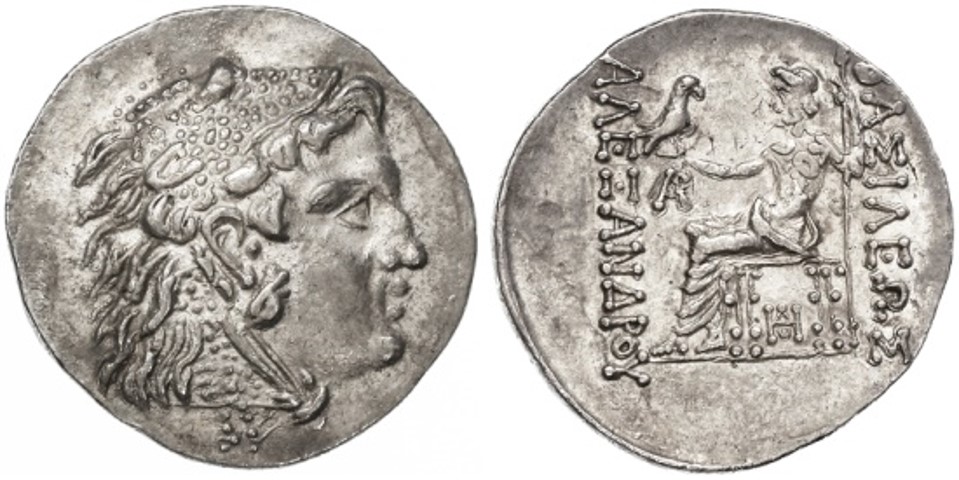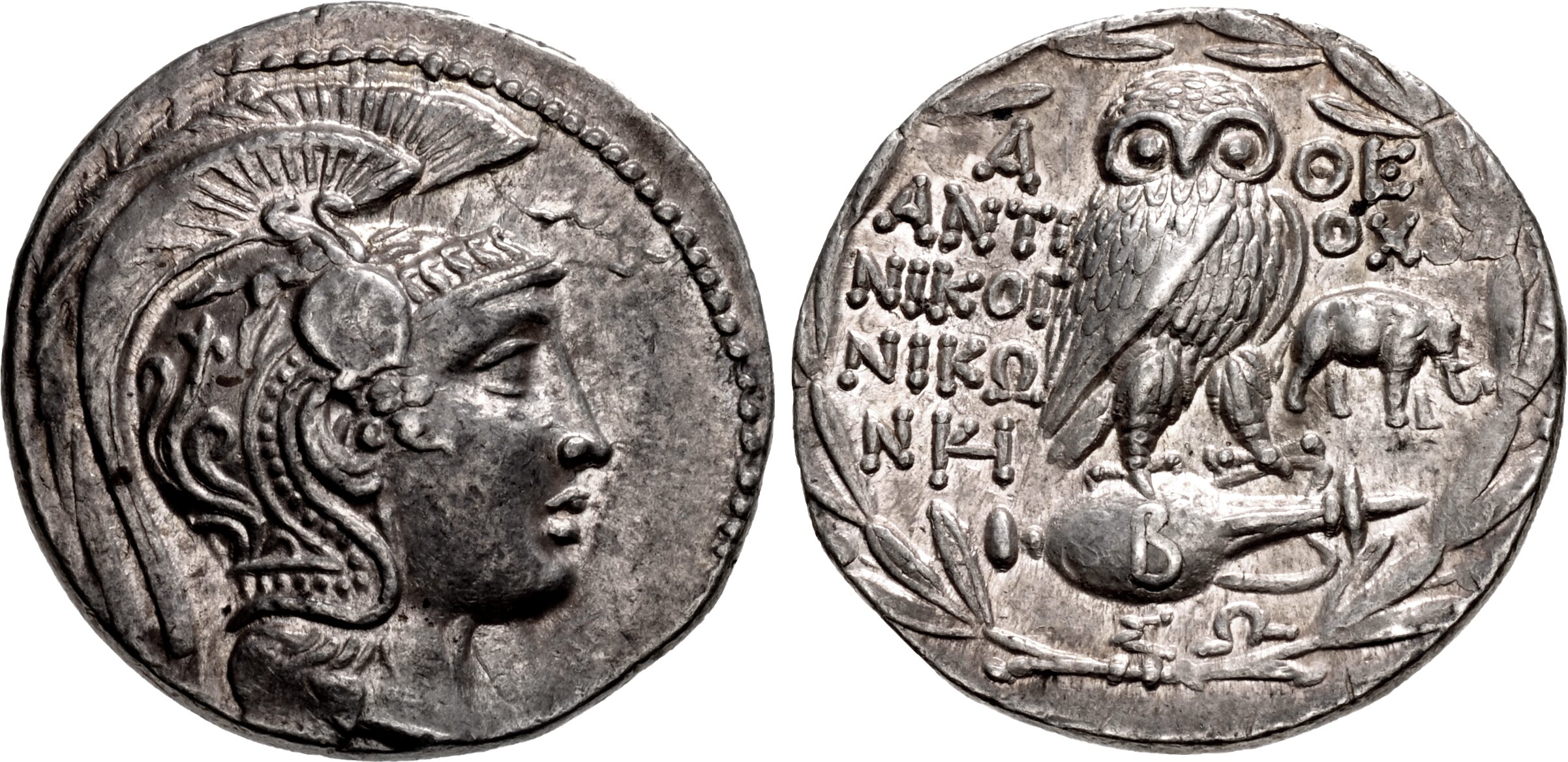120 BCE - 90 BCE | BAΣΙΛΕΩΣ AΛΕΞANΔΡΟΥ
Overstriking coin
Odessus 859 over Athens.jpg
Description
| ObverseInscription or printing placed on the obverse.:
|
Head of Herakles right, wearing lion skin headdress.
|
ReverseInscription or printing placed on the reverse.:
|
BAΣΙΛΕΩΣ AΛΕΞANΔΡΟΥ (Greek) Zeus enthroned left, holding eagle and scepter. Under the throne, monogram (ΗΔΟ). In left field, monogram (ΑΡ).
|
Mint and issuing power
| MintIdentifies the place of manufacture or issue of a numismatic object.:
|
Odessus
|
Ancient regionAncient region.
|
Thrace
|
Modern countryModern country: Bulgaria
|
AuthorityIdentifies the issuing power. The authority can be "pretended" when the name or the portrait of X is on the coin but he/she was not the issuing power. It can also be "uncertain" when there is no mention of X on the coin but he/she was the issuing power according to the historical sources:
|
Alexander III the Great (Argead king, 336-323 BC)
|
Chronology
| FromIdentifies the initial date in a range assigned in a numismatic context. 120 BCE toIdentifies the final date in a range assigned in a numismatic context.. 90 BCE
|
hellenistic periodTime period of the numismatic object.
|
Physical description
MetalThe physical material (usually metal) from which an object is made.: Silver 
|
WeightWeight of the numismatic object (in grams). in grams: 16.4416.44 g <br />16,440 mg <br />
|
DenominationTerm indicating the value of a numismatic object. Examples: tetradrachm, chalkous, denarius.: tetradrachm 
|
|
| DiameterDescribes diameter of an object (in mm).: 3333 mm <br />3.3 cm <br />
|
StandardStandard.: Attic
|
References
Description
| ObverseInscription or printing placed on the obverse.:
|
Helmeted head of Athena Parthenos right
|
ReverseInscription or printing placed on the reverse.:
|
(Greek) Owl standing right, head facing, on amphora, magistrates' names in fields, monogram to lower left, to right, elephant standing right, B on amphora, ΣΩ below, all within wreath
|
Mint and issuing power
| MintIdentifies the place of manufacture or issue of a numismatic object. ᵖ:
|
Athens
|
Ancient regionAncient region. ᵖ
|
Attica
|
Modern countryModern country: Greece
|
AuthorityIdentifies the authority in whose name (explicitly or implicitly) a numismatic object was issued. ᵖ:
|
|
Chronology
| FromIdentifies the initial date in a range assigned in a numismatic context. 131 BCE toIdentifies the final date in a range assigned in a numismatic context.. 130 BCE
|
Hellenistic 323-30 BC  periodTime period of the numismatic object. periodTime period of the numismatic object.
|
Physical description
| DenominationTerm indicating the value of a numismatic object. Examples: tetradrachm, chalkous, denarius. ᵖ:
|
tetradrachm 
|
StandardStandard. ᵖ:
|
Attic
|
References
| Frequency of overstrikesFrequency of overstrikes:
|
rare and concentrated
|
Level of confidenceLevel of confidence of the identification:
|
strong
|
| RemarksRemarks:
|
"It appears to be overstruck on an earlier Odessos issue of Alexander the Great (like Price 1168) struck from 280 - 200 B.C.E. and was taken back into the mint for restriking. Looking at Zeus on the reverse across the left side of his shoulder to chest, one can see the KOI mintmark of the earlier issue. Traces of other letters can also be seen" (nb: David MacDonald: The seller thinks this is struck over an earlier Odessos. I think this is wrong and that the host coin was an Athenian New Style: yes 131/130 BC Thompson 396c).
|
References
- ^ Price, Martin Jessop (1991), The Coinage in the Name of Alexander the Great and Philip Arrhidaeus: a British Museum Catalogue, 2 vol., Zürich-London, 637 p., 637 p., clix pl.
- ^ Thompson, Margaret (1961), The new style silver coinage of Athens, Numismatic Studies 10, New York, 2 vol.
- ^ Hoover, Oliver D. (2014), Handbook of Greek Coinage Series 4. Northern and Central Greece : Achaia Phthiotis, Ainis, Magnesia, Malis, Oita, Perrhaibia, Thessaly, Akarnania, Aitolia, Lokris, Phokis, Boiotia, Euboia, Attica, Megaris and Corinthia, sixth to first centuries BC, Lancaster, lxxi, 563 p.


